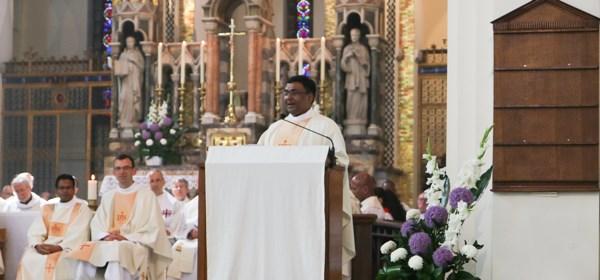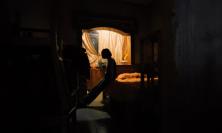The Mass was ‘a primary locus of St Ignatius’s spiritual life’, and the founder of the Society of Jesus wrote often about his spiritual experiences during Mass. Newly-ordained priest, Kensy Joseph SJ, draws on those accounts to reflect on what it means to ‘pray’ the Mass.
‘After ordination, you’ll spend the first few years learning to “say” the Mass. After that, you can start to “pray” it.’
This advice came from a Jesuit priest supervising one of my ‘dry’ (practice) Masses a few weeks before my ordination. Right now, I’m still learning to ‘say’ the Mass: navigating the various prayers and options in the missal; adjusting vocabulary, tone and volume depending on the church or chapel I’m celebrating Mass in and the community I’m celebrating for; staying aware of my surroundings (and not knocking anything over!), etc. But ‘praying’ the Mass — what an intriguing experience to look forward to!
Growing up, Mass was something I ‘went to’ (or, often, ‘was made to go to’!), ‘attended’ or ‘heard’. The priest ‘said’ or ‘celebrated’ the Mass. In my mother tongue, Malayalam, the corresponding term could be translated as ‘reciting’, ‘chanting’ or even ‘singing’ the Mass. But I’d never heard of praying the Mass. Prayer, I thought, was something one did on one’s own, or with a group. One could pray with Scripture, or pray the rosary or other devotions. Prayer could be internalised and quiet, as it might be in one’s room or at silent Adoration. Alternatively, it could be externalised and vocal, as at a prayer meeting.
Formerly, when I thought about prayer, I was thinking about personal (or private) prayer, which is usually distinguished from liturgical (or public) prayer.[i] In the New Testament, leitourgia refers to a sacrificial offering (Phil 2:17) or some kind of ministry of service (2 Cor 9:12), especially priestly ministry (Luke 1:23; Heb 8:6). Liturgical prayer is a memorial of Christ the High Priest’s sacrificial self-offering; it is ‘the prayer of Christ through the church for the world’.[ii] Essentially, liturgical prayer unites the prayer of the Christian community with the prayer of Christ himself. The Mass is liturgical prayer par excellence.[iii]
Of course, I did (and still do!) engage in personal prayer during Mass – I suspect that I would not have been a candidate for ordination if I had never had an experience of God at Mass! The Mass itself provides many opportunities for this: when the priest says ‘let us acknowledge our sins’ or ‘let us pray’, for example, or during the Eucharistic Prayer. I might engage in mini-lectio divina and dwell prayerfully on some aspect of the readings, or the homily. However, praying the Mass seems to call for something more comprehensive, to which I think St Ignatius Loyola alludes when he describes his experience of the Mass.
St Ignatius and the Mass
St Ignatius was no stranger to praying during Mass. He acquired the habit, during his conversion and the deepening of his spiritual life at Manresa, of reading an account of the Passion during Mass and finding consolation in it.[iv] However, he was not insensitive to the divine mystery present at Mass: he describes a spiritual experience he had, during this period, of the Real Presence in the Eucharist:
… hearing mass one day, as the body of the Lord was being raised, he saw with his interior eyes some things like white rays which were coming from above. And although after so long a time he cannot properly explain this, still what he saw clearly with his understanding was to see how Jesus Christ Our Lord was present in that most holy sacrament.[v]
This, and other spiritual consolations experienced at Mass, must have cemented the significance of the Mass and the Eucharist for St Ignatius. He and his companions made their first formal commitment to fellowship in service of the Lord at Montmartre in 1534. The promise was made at Mass celebrated by Pierre Favre, at that time the only one of the group who was ordained. To this day, every member of the Society pronounces his vows to our triune God at the moment of communion, in the sacramental presence of Christ.
Once he was ordained, St Ignatius postponed the celebration of his first Mass for a year in order to prepare himself spiritually.[vi] This Mass was celebrated in the Chapel of the Nativity of the Basilica of St Mary Major in Rome on Christmas night, 1538.
The Mass would continue to be a primary locus of St Ignatius’s spiritual life. We can see this in his Spiritual Diary of 1544, where he engages in a process of discernment about the manner in which the infant Jesuit order was to live in poverty.[vii] Almost every entry in the diary begins with a description of the consolations received at Mass, characteristically in the gift of tears.[viii] The entirety of his first entry (2 February 1544) reads:
Great devotion during mass, with tears, with increased trust in Our Lady, and more inclined both then and during the whole day to choose complete poverty.
Unsurprisingly, he commended daily participation in Mass for members of the Society of Jesus, especially those in formation.[ix] (Jesuits in formation were to spend an additional hour each day in personal prayer and making the twice-daily examen.) That St Ignatius saw the Mass as the focal point of the spiritual life of Jesuits could be inferred from the fact that while he did not prescribe fixed periods of prayer for formed Jesuits, he continued to encourage frequent participation at Mass.[x]
This suggests that St Ignatius’s ideal is the harmonic unity of personal prayer and liturgical prayer at Mass. The Mass does not replace personal prayer (particularly the examen); but neither is it simply a ritualisation of personal prayer. Rather, the Mass, uniquely the prayer of Christ, is what both feeds our prayer as individuals and as community, and draws the two together: the ‘source and summit’ of Christian life.
Kensy Joseph SJ was ordained to the priesthood in June 2018 by Bishop Nicholas Hudson.
[i] For a quick introduction, see Dcn. Anthony Curran, Two Paths of Prayer on the Westminster diocese website: https://rcdow.org.uk/news/the-two-paths-of-prayer/ . The terminology for what I am calling personal prayer is varied. In spirituality works it is often referred to as devotional prayer; but this might mislead the reader into thinking that it is limited to traditional devotions such as the rosary, chaplets etc. Calling it non-liturgical prayer defines it by what it is not, rather than what it is. The term private prayer can also be misleading, though technically correct, in that, for instance, a Taizé prayer session in a church or chapel would fall into this category. In the end, personal prayer seems the least problematic; I would remind the reader that this does include communal prayers such as the rosary.
[ii] ibid.
[iii] Other liturgical prayers include: the rites of celebration of the sacraments, the Divine Office and other rites and blessings established by the Church.
[iv] St Ignatius of Loyola, ‘Autobiography’ [§20]. There are many translations of St Ignatius’s autobiography available; I recommend the translation by Joseph Munitiz and Philip Endean (eds.), Saint Ignatius of Loyola: Personal Writings (Penguin Classics: 1996).
[v] ibid., §29.
[vi] ibid., §96.
[vii] The specific question was whether Jesuit churches were to have fixed incomes, e.g. rents, rather than relying solely on alms. The ‘Spiritual Diary’ is also translated in Munitiz and Endean.
[viii] See St Ignatius’ ‘Spiritual Exercises’ [§316]: ‘Similarly, I use the word ‘consolation’ when one sheds tears that lead to love of one’s Lord, whether these arise from grief over one’s sins, or over the Passion of Christ our Lord, or over other things expressly directed towards His service and praise.’ (translated in Munitiz and Endean)
[ix] ‘Constitutions’ [§342] in John W. Padberg SJ (ed.), The Constitutions of the Society of Jesus and Their Complementary Norms: A Complete English Translation of the Official Latin Texts (The Institute of Jesuit Sources: St Louis, 1996).
[x] ‘Constitutions’ [§584].






